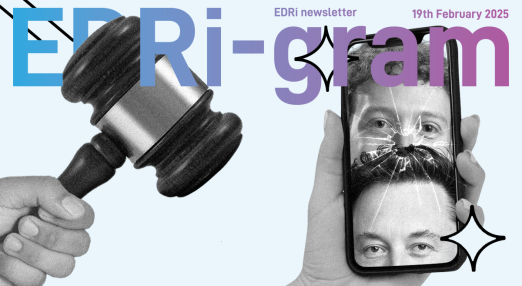EDRi-gram, 12 June 2025
What has the EDRis network been up to over the past two weeks? Find out the latest digital rights news in our bi-weekly newsletter. In this edition: UK data adequacy under scrutiny, ProtectEU strategy a step further towards digital dystopia, and more!
Filter resources
-

EDRi-gram, 12 June 2025
What has the EDRis network been up to over the past two weeks? Find out the latest digital rights news in our bi-weekly newsletter. In this edition: UK data adequacy under scrutiny, ProtectEU strategy a step further towards digital dystopia, and more!
Read more
-

EDRi-gram, 28 May 2025
What has the EDRis network been up to over the past two weeks? Find out the latest digital rights news in our bi-weekly newsletter. In this edition: Reopening the GDPR is a threat to our rights, 6 years of fighting censorship by Meta in Poland, & more!
Read more
-

EDRi-gram, 7 May 2025
What has the EDRis network been up to over the past two weeks? Find out the latest digital rights news in our bi-weekly newsletter. In this edition: Apple & Meta fined for breaching DMA, civil society urges EU to act against Hungary’s pride ban, & more!
Read more
-

Showing your ID to get online might become a reality – a closer look at the EU’s new age verification app
Coming to a website near you this summer: the European Commission is close to a ‘solution’ that could force people to use their government-issued ID to get online. EDRi and EFF’s concerns about threats to everyone’s privacy and data protection, a chilling effect on access to information, and digital exclusion – harming the already most marginalised in society - remain unsolved.
Read more
-

Commission slams Apple and Meta for breaching the Digital Markets Act, doesn’t stick the landing with fines
The European Commission has shown some teeth with the EU’s digital rulebook by slamming tech giants Apple and Meta with fines, and an order to stop the infringing behaviour. While we commend the strong stance, we're concerned about whether the low fines will actually lead to change of behaviour from the tech giants.
Read more
-

EDRi-gram, 16 April 2025
What has the EDRis network been up to over the past two weeks? Find out the latest digital rights news in our bi-weekly newsletter. In this edition: Challenging data retention regime in Poland, Ljubljana’s municipal surveillance, and more!
Read more
-

Civil society files DSA complaint against Meta for toxic, profiling-fueled feeds
Civil society organisations Bits of Freedom, Convocation Design + Research, European Digital Rights (EDRi), and Gesellschaft für Freiheitsrechte (GFF) are filing a complaint against Meta for violating the Digital Services Act (DSA).
Read more
-

EDRi-gram, 2 April 2025
What has the EDRis network been up to over the past two weeks? Find out the latest digital rights news in our bi-weekly newsletter. In this edition: DSA complaint X, New civic coalition for journalists and civil society, imagining EU-topia, & more!
Read more
-

EDRi files DSA legal complaint against X
EDRi and our member ApTI filed a DSA complaint against social media giant 'X' for breaching its obligations towards Trusted Flaggers.
Read more
-

EDRi-gram, 5 March 2025
What has the EDRis network been up to over the past two weeks? Find out the latest digital rights news in our bi-weekly newsletter. In this edition: Our call to reject the Europol reform, UK and France launch fresh attacks on encryption, & more!
Read more
-

EDRi-gram, 19 February 2025
What has the EDRis network been up to over the past two weeks? Find out the latest digital rights news in our bi-weekly newsletter. In this edition: Commission withdraws ePrivacy proposal, new database to track investigations into Big Tech, & more!
Read more
-

The Digital Services Coordinator Database: Tracking DSA investigations into Big Tech
EDRi has launched its Digital Services Coordinator Database which provides a comprehensive overview of all enforcement authorities and the cases they have taken against online platforms under the EU’s Digital Services Act.
Read more
